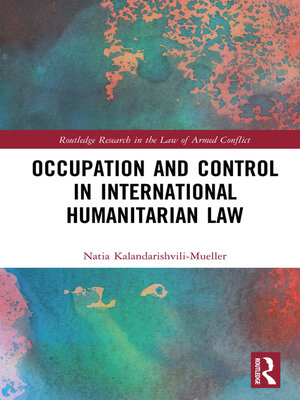Occupation and Control in International Humanitarian Law
ebook ∣ Routledge Research in the Law of Armed Conflict
By Natia Kalandarishvili-Mueller

Sign up to save your library
With an OverDrive account, you can save your favorite libraries for at-a-glance information about availability. Find out more about OverDrive accounts.
Find this title in Libby, the library reading app by OverDrive.



Search for a digital library with this title
Title found at these libraries:
| Library Name | Distance |
|---|---|
| Loading... |
This book presents a systematic analysis of the notion of control in the law of military occupation. The work demonstrates that in present-day occupations, control as such occurs in different forms and variations. The polymorphic features of occupation can be seen in the way states establish control over territory either directly or indirectly, and in the manner in which they retain, relinquish or regain it. The question as to what level and type of control is needed to determine the existence and ending of military occupation is explored in great detail in light of various international humanitarian law instruments. The book provides an anatomy of the required tests of control in determining the existence of military occupation based on the law. It also discusses control in relation to occupation by proxy and when and how the end of control over territory occurs so that military occupation is considered terminated. The study is informed by relevant international jurisprudence. It draws on numerous pertinent case studies from all over the world, various reports by different UN entities and other international organisations, as well as legal doctrine.
The book will be a valuable resource for academics, researchers and practitioners working in the fields of international humanitarian law, international public law, and security studies







